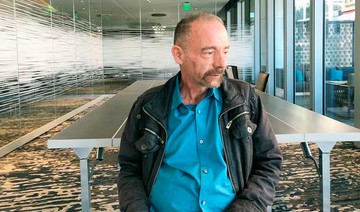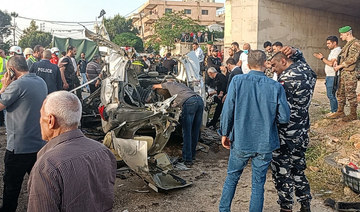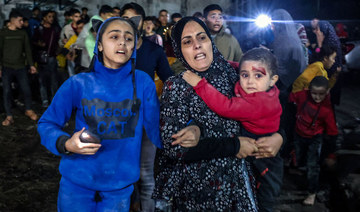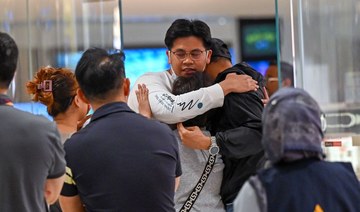KARACHI: At least 90 people, including 65 children, are believed to have been infected with the HIV virus in Pakistan by a doctor using a contaminated syringe, officials said Friday.
“We have arrested a doctor after receiving complaints from the health authorities,” said Kamran Nawaz, the local police chief heading the case in the southern city of Larkana.
“We are told that the doctor also has HIV,” he said.
Authorities were first alerted last week after 18 children from a town on the outskirts of the city tested positive for the virus, which causes AIDS, prompting health officials to carry out wider screenings.
Dozens more infections were found.
“More than 90 people have tested HIV positive and the number of children is around 65,” Dr. Abdul Rehaman, a district health official in Larkana, told AFP.
A second official confirmed the outbreak, although gave slightly different figures.
Authorities said they traced the outbreak to a single doctor, who appears to have been using a contaminated syringe on patients.
Azra Pechuho, Sindh province’s health minister, confirmed his arrest.
“The blood of the parents of the infected children was also tested, but their results were negative,” Pechuho added.
Officials have since launched an even larger testing and education drive.
Pakistan is considered a low prevalence country for HIV, but the disease is expanding — mostly among intravenous drug users, sex workers and migrant laborers returning from the Gulf.
Pakistan police arrest doctor after 90 infected by HIV syringe
Pakistan police arrest doctor after 90 infected by HIV syringe
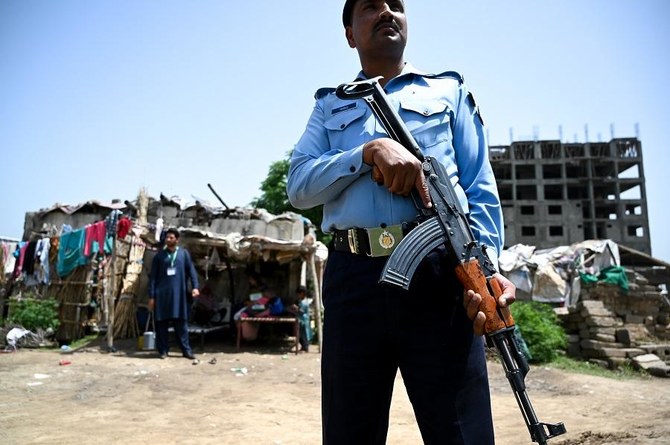
- Authorities were first alerted last week after 18 children from a town on the outskirts of the city tested positive for the virus
- Authorities said they traced the outbreak to a single doctor, who appears to have been using a contaminated syringe on patients
French city postpones Israeli film festival amid Gaza tensions
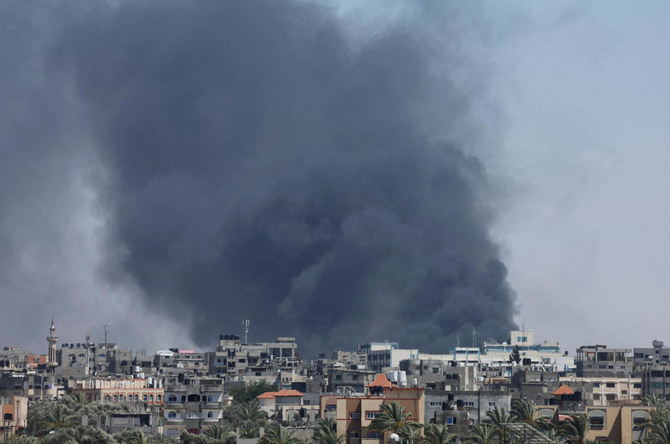
The Shalom Europa festival said on its Facebook page that “events” had forced the decision to hold the event at a “calmer” time
STRASBOURG, France: An Israeli film festival in the eastern French city of Strasbourg has been indefinitely postponed as the Gaza war rages, authorities said Friday.
The Shalom Europa festival has been hosted in the city for 15 years and was scheduled to be held from June 16 to June 20. But France has reported an increased number of anti-Semitic attacks since the Gaza war erupted on October 7.
The city council did not give a reason for the postponement but said Strasbourg “has always supported the Shalom Europa festival and will continue to do so. It promises to help hold the festival on a date that is opportune for the organizers.”
The Israeli community group that organizes the event did not reply to AFP requests for comment.
The Shalom Europa festival said on its Facebook page that “events” had forced the decision to hold the event at a “calmer” time, adding that “The safety and well-being of our participants is our absolute priority.”
The French Jewish community, the third largest in the world, has for months been on edge in the face of a growing number of attacks and desecrations of memorials.
On May 17, French police shot dead a man who set fire to a synagogue in the northern city of Rouen.
UK government ‘unequivocally failing’ Palestinians in Gaza, says charity adviser
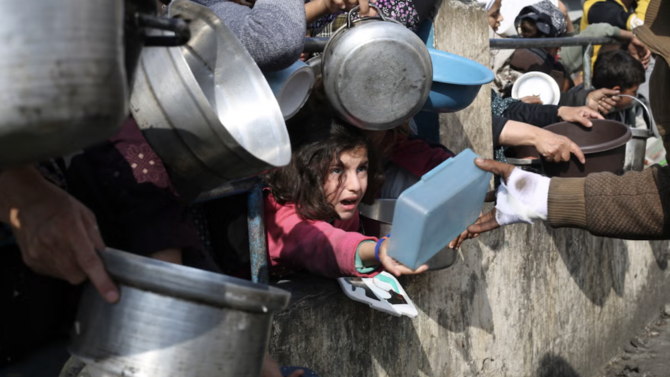
- Save the Children official questions UK’s commitment to upholding international humanitarian law
- Young people in Gaza enduring ‘the most dangerous and dire situation for children anywhere in the world’
LONDON: Palestinians in Gaza, and particularly young people, are being “unequivocally failed” by the British government, a charity adviser said on Friday.
Liz Bradshaw, Save the Children’s senior adviser on the Israel-Hamas conflict, told The Independent newspaper that a “shameful failure by the UK government” was having a huge impact on youngsters living through “the most dangerous and dire situation for children anywhere in the world.”
Health officials in Gaza say more than 35,000 Palestinians, over half of them women and children, have been killed in the territory since Oct. 7 and the outbreak of an Israeli retaliation for a Hamas attack in southern Israel, which claimed around 1,200 lives.
Bradshaw said UK arms sales to Israel were having a “high impact” on the lives of Palestinian civilians. David Cameron, the UK foreign secretary, recently admitted that he was “not really interested” in stopping weapon sales to Israel.
Children in Gaza faced immediate physical risk “from horrific blast injuries caused by the use of explosive weapons in intensely dense populated areas, like Rafah, or from amputations, leaving them in agonizing pain,” Bradshaw said.
She added that, in places like Rafah where the Israeli military is engaged in an offensive, people were facing repeated displacement “in some cases, four or five, six times condensed into ever smaller areas, where frankly, there just simply aren’t the conditions for that number of people to survive.”
According to Bradshaw, children in Gaza are in acute need of mental health support to deal with the “lifelong” psychological scars they will have gained from what they have witnessed.
She also called into question the UK government’s commitment to upholding international humanitarian law and to protecting civilians suffering in Gaza.
“The UK speaks in very powerful terms about protection of civilians in other parts of the world like Ukraine, so why are we not seeing the same level of commitment and concern in relation to Palestinian children in Gaza?” she asked.
“It’s pretty abject stuff. We hear a lot about the deep concern that they have, but frankly, their deep concern is meaningless to children in Gaza. And it’s meaningless to our staff who are desperately battling against the odds to help children. We need action, not words from this government, and it’s long, long overdue.”
Germany, Portugal say time not ripe to recognize Palestinian state

- “There is no clarity about the territory of the state and other questions related to it,” Scholz said
- Montenegro said Portugal was also “not in the position to” recognize a Palestinian state
BERLIN: The leaders of Germany and Portugal said Friday the time was not ripe to recognize a Palestinian state, after three other European nations announced plans to do so.
“We have no reason to recognize the Palestinian Authority as a separate state now,” Chancellor Olaf Scholz told a press conference after talks with Portuguese Prime Minister Luis Montenegro.
“There is no clarity about the territory of the state and other questions related to it,” he said.
“What we need is a negotiated solution between Israel and the Palestinians that amounts to a two-state solution... but we are still a long way from there,” he said.
“Symbolic recognition of statehood does not bring us further” toward the goal, he added.
Speaking at the same press conference, Montenegro said Portugal was also “not in the position to” recognize a Palestinian state.
“We are waiting for the (related) issues to be further discussed within the European Union,” he added.
Ireland, Norway and Spain on Wednesday announced they intended to recognize the State of Palestinian next week.
The announcement drew fury from Israel, which warned of “serious consequences” for ties with the European nations.
For decades, formal recognition of a Palestinian state has been seen as the end goal of a peace process between Palestinians and Israel.
The United States and most western European nations have said they are willing to one day recognize Palestinian statehood, but not before agreement is reached on thorny issues like final borders and the status of Jerusalem.
Top UN court orders Israel to halt military operation in Rafah, Israel is unlikely to comply
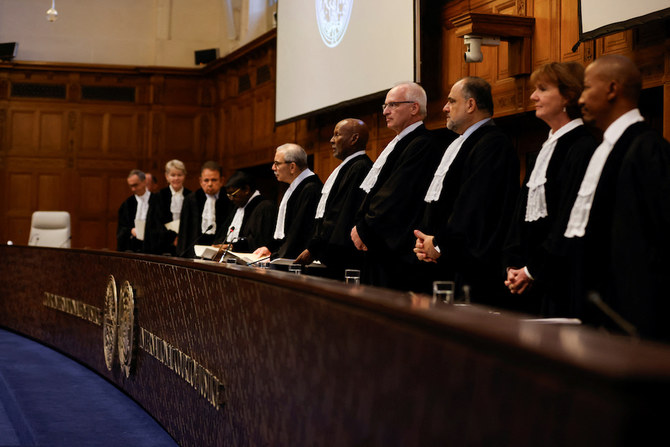
- The ICJ order further ratchets up international pressure on an increasingly isolated Israel to rein in its war on Hamas in Gaza
- Friday’s decision marked the third time this year the 15-judge panel has issued preliminary orders seeking to rein in the death toll and alleviate humanitarian suffering in Gaza
THE HAGUE: The top United Nations court has ordered Israel to halt its military operations in the southern Gaza city of Rafah. Israel insists it has the right to defend itself from Hamas militants and is unlikely to comply with the ruling.
The order by the International Court of Justice further ratchets up international pressure on an increasingly isolated Israel to rein in its war on Hamas in Gaza.
Friday’s decision marked the third time this year the 15-judge panel has issued preliminary orders seeking to rein in the death toll and alleviate humanitarian suffering in Gaza.
While orders are legally binding, the court has no police to enforce them.
Earlier Friday, the ICJ opened its hearing to rule on the request to order Israel to halt its military operation in Gaza and withdraw from the enclave.
Criticism of Israel’s conduct in the war in Gaza has been growing — even from its closest ally, the United States, which warned against an invasion of the southern city of Rafah, where hundreds of thousands of Palestinians have sought shelter from fighting elsewhere. And this week alone, three European countries announced they would recognize a Palestinian state, and the chief prosecutor for another UN court requested arrest warrants for Israeli leaders, along with Hamas officials.
Israeli Prime Minister Benjamin Netanyahu is also under heavy pressure at home to end the war, which was triggered when Hamas-led militants stormed into Israel, killing 1,200 people, most civilians, and taking some 250 captive. Thousands of Israelis have joined weekly demonstrations calling on the government to reach a deal to bring the hostages home, fearing that time is running out.
While the International Court of Justice has broad powers to order an end to the Israeli military campaign and any such ruling would be a blow to Israel’s international standing, it does not have a police force to enforce its orders. In another case on its docket, Russia has so far ignored a 2022 order by the court to halt its full-scale invasion of Ukraine.
Israel signaled it, too, would brush off an ICJ order to stop its operations. “No power on earth will stop Israel from protecting its citizens and going after Hamas in Gaza,” Avi Hyman, the government spokesperson, said in a press briefing Thursday.
The court’s president, Nawaf Salam, opened Friday’s hearing, as a small group of pro-Palestinian protesters demonstrated outside.
The ceasefire request is part of a case filed late last year by South Africa accusing Israel of committing genocide during its Gaza campaign. Israel vehemently denies the allegations. The case will take years to resolve, but South Africa wants interim orders to protect Palestinians while the legal wrangling continues.
At public hearings last week at the International Court of Justice, South Africa’s ambassador to the Netherlands, Vusimuzi Madonsela, urged the panel of 15 international judges to order Israel to “totally and unconditionally withdraw” from the Gaza Strip.
The court has already found that Israel’s military operations pose a “real and imminent risk” to the Palestinian people in Gaza.
Israel’s offensive has killed more than 35,000 Palestinians, according to Gaza’s Health Ministry, which does not distinguish between combatants and civilians. The operation has obliterated entire neighborhoods, sent hundreds of thousands of people fleeing their homes, and pushed parts of the territory into famine.
“This may well be the last chance for the court to act,” Irish lawyer Blinne Ní Ghrálaigh, who is part of South Africa’s legal team, told judges last week.
Israel rejects the claims by South Africa, a nation with historic ties to the Palestinian people.
“Israel takes extraordinary measures in order to minimize the harm to civilians in Gaza,” Tamar Kaplan-Tourgeman, a member of Israel’s legal team, told the court last week.
In January, ICJ judges ordered Israel to do all it can to prevent death, destruction and any acts of genocide in Gaza, but the panel stopped short of ordering an end to the military offensive. In a second order in March, the court said Israel must take measures to improve the humanitarian situation.
The ICJ rules in disputes between nations. A few kilometers (miles) away, the International Criminal Court files charges against individuals it considers most responsible for war crimes, crimes against humanity and genocide.
On Monday, its chief prosecutor, Karim Khan, said he has asked ICC judges to approve arrest warrants for Netanyahu, Defense Minister Yoav Gallant and three top Hamas leaders — Yahya Sinwar, Mohammed Deif and Ismail Haniyeh — of war crimes and crimes against humanity in the Gaza Strip and Israel.
Israel is not an ICC member, so even if the arrest warrants are issued, Netanyahu and Gallant do not face any immediate risk of prosecution. But the threat of arrest could make it difficult for the Israeli leaders to travel abroad.
Passengers had seconds to react as turbulence hit Singapore flight
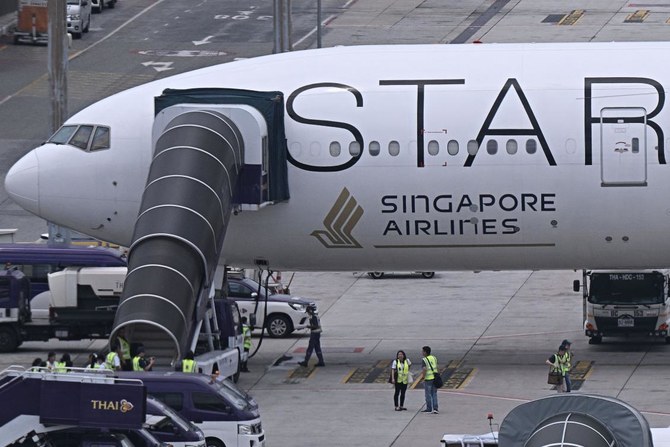
- Passengers and crew on the flight sustained skull, brain, and spine injuries as they were tossed violently around the cabin
- The flight carrying 211 passengers and 18 crew was forced to make an emergency landing in Bangkok
BANGKOK: A Malaysian woman whose six relatives and a friend were injured on a Singapore Airlines flight hit by deadly turbulence this week said on Friday they had only seconds to react before the plane started to plunge.
One passenger died and more than 100 were injured when the Boeing 777-300ER fell 1,800 meters (6,000 feet) in just a few minutes during the final hours of its journey from London to Singapore on Tuesday.
Passengers and crew on the flight sustained skull, brain, and spine injuries as they were tossed violently around the cabin.
The flight carrying 211 passengers and 18 crew was forced to make an emergency landing in Bangkok, where at least 48 people are still being treated in hospital.
Eva Khoo, who prayed for her family at the Erawan Shrine in the Bangkok city center on Friday, said she was desperately concerned for her pregnant sister-in-law.
“My sister-in-law had to have surgery on her spine,” she told AFP.
“I am really worried because she is pregnant.”
The family was returning from a two-week holiday in Switzerland and Britain.
Khoo said her brother was still in pain after the high-altitude ordeal.
“His hand is in pain and still numb,” she said.
“He couldn’t carry anything. He still needs a wheelchair to move him around.”
She said four of her relatives who were on the flight were treated in intensive care at a Bangkok hospital.
“Some of them are still in bed and can’t be moved,” she said.
Her brother told her that the seatbelt sign was off and the situation was “very calm” when the turbulence hit.
“They were serving food and collecting rubbish and suddenly the plane was shaking and my brother and his wife were sitting without (a) seatbelt,” she said.
“They felt the vibration and the shaking, they wanted to fasten the seatbelt, but (they) only (had) a few seconds.”
Her brother “flew away” and hit the floor while he was trying to fasten his belt, she said.
Her sister-in-law flew up and dropped onto a seat in the plane.
She said a family friend who was on the flight had fastened his seatbelt but still sustained a neck injury and will have to use back support for at least six months.
The plane was met at Bangkok’s Suvarnabhumi Airport by emergency responders who used gurneys to ferry the injured to ambulances waiting on the tarmac.
Photos taken inside the plane after it landed in Bangkok show the cabin in chaos, strewn with food, drinks and luggage, and with oxygen masks dangling from the ceiling.
Singapore Airlines chief executive Goh Choon Phong has apologized for the “traumatic experience” and expressed condolences to the family of the deceased — a 73-year-old British man.
The carrier said on Friday it has tightened seatbelt rules on its flights after the incident and that it has introduced a “more cautious approach” to turbulence.
Investigators are analizing cockpit data — including the voice recorder — as they seek to understand the cause of the deadly incident.
Air safety experts have told AFP that passengers are often too casual about wearing seatbelts, leaving them at risk if the plane hits unexpected turbulence.
Scientists also warn that so-called clear air turbulence, which is invisible to radar, is getting worse because of climate change.




